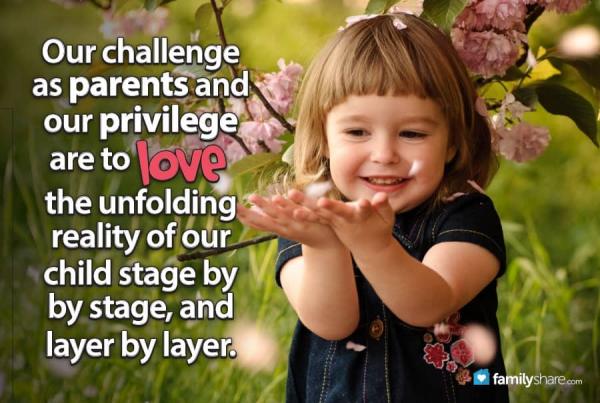
When we become parents, it is only natural that we have hopes and dreams of what our child will someday grow up to be. We tend to project onto our children the images of our own hopes and dreams. Sometimes we hope they will grow up to be just like us, or we hope they will turn out nothing like us, compensating for weaknesses we perceive in ourselves. Whatever images we project on our children, one thing is certain: Like it or not, our children will grow up to be whom they are - not necessarily who we have imagined they would someday be.
Our challenge as parents - and our privilege - are to love the unfolding reality of our child - stage by stage, and layer by layer. The older they get, the more they tend to exhibit the unique individuality of their core nature. The baby we cradle in our arms may not look or act considerably different than any other baby. All young infants share the need for food, warmth, security - and frequent diaper changes. Yet, even in these very young children, individual differences are noticeable; differences, for example, in what elements of life delight, frighten, comfort, or motivate them.
Individuality begins to blossom abundantly as children grow into toddlerhood as they learn to say "no"� and "mine"�, thus separating themselves from parents, and practicing their budding capacity for having their own opinions and desires. This stage can be challenging for parents, especially those who expect a high level of compliance, "You'll do it this way because I told you to"�. Or, it can be a grand unfolding adventure of discovery as the child begins to see the world through his own unique eyes, demonstrating his own preferences and individual traits, and you as his parent discover that new world along with him.
As children grow, they may become individuals very different than what their parents had originally hoped or envisioned. The would-be quarterback may become the sensitive songwriter. The hoped-for feminine daughter may reject the intended pink lacy dresses, and prefers to spend her early years in athletic-looking activewear and torn blue jeans. A child may demonstrate a talent or interest that varies significantly from our own preferences. He may choose a different religious, political, or sexual orientation from what we might have preferred. She may choose a very different life path than the one we had envisioned for her.
How can we appreciate and love our children for the individuals they are? How can we nurture and support the unique talents and gifts they bring with them into the world?
1. Keep an open mind
Your children may choose to follow your preferred course in life - or they may not. You can have a rich, eye-opening adventure with each of your children, as you learn to see the world through their eyes, and as you nurture respect for the individual reality of whom your child reveals himself or herself to be over time.
2. I dentify and support your child's unique talents
Provide opportunities and materials for your child to grow in the direction of his or her own individual gifts. Lessons, team membership, instruments and other resources can help greatly in this process.
3. B e willing to learn from your child
As your child grows, he or she may display interests or capacities that are beyond the range of your own life experience. Your own worldview and abilities can grow by leaps and bounds, as you remain willing to learn new skills, have new experiences, and enjoy new things alongside your child.
4. Resist the temptation to insist on simple compliance
There may be more than one effective way to do any given task. Be willing to see things in another way than what is natural for you. This can be challenging, but it can be one of the most meaningful gifts you can give to any other person, and is especially empowering for your child.
5. E xpress appreciation for your child's individuality
Tell your child often how proud you are of them for the unique things they contribute to your family, and to the world around them.
6. L ove them for who they really are
There is nothing more affirming than being loved for being yourself rather than what somebody wanted or expected you to be. That is a gift of immeasurable value that will serve and sustain your child throughout their entire lifetime.

